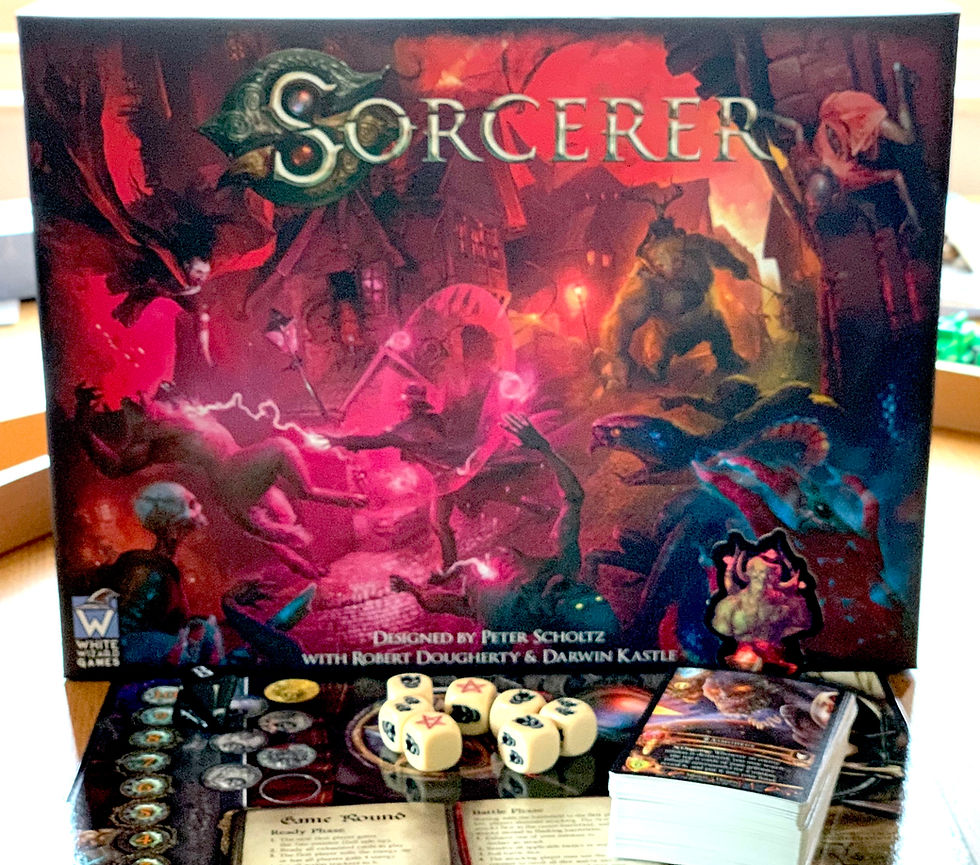Sorcerer
- Toby Hicks
- Nov 15, 2019
- 3 min read
Updated: Oct 24, 2020
Designed by Peter Scholtz and published by White Wizard, Sorcerer is a 2-4 player card drafting/deck building game set in the shadowed alleyways and cobbled streets of Victorian London. Players take on the roles of rival sorcerers, each with different background, play style and selection of skills, minions and abilities. You battle it out until one of you achieves control over two of the three zones of play.
To start each game players will choose a set of Character, Lineage and Domain cards. These shape how you will play the game to come. There are no restrictions as to which combination you can/cannot choose and, with four characters, lineages and domains to choose from in the base game, you are blessed with a great number of potential combinations. Focuses range from setting enemies on fire for continuous damage, sacrificing your minions to further your cause and stealing cards from your opponent to enhance yourself, so there is something for everyone.
Once you have constructed your deck you can get down to the business of taking over London.

Each player has a player board. These are well-made with different artwork on each side that adds visual variety. This board also serves to keep track of the number of actions you have available, your energy (the resource used in-game to cast spells), your Omen counters (a finite resource used to modify dice rolls) and your Grimoire (deck) and graveyard (discard pile).
Play proceeds in four phases. In the Ready phase, you reset the number of actions to six, draw an Omen token and choose which of the three zones of play you would like to place your avatar. The game offers the option of everyone getting 4 energy or introducing a luck element by rolling for energy using an 8-sided die. In either event, all players get the same amount.
In the Action phase, players spend their energy and action points to cast spells in the form of minions (summoned into one of the three zones of play), equipment to enhance their minions or sorceries to have an immediate effect, such as removing a minion. During the Battle phase, minions will attack opposing minions in their zone or attack the zone itself. Attacks involve rolling custom six-sided dice and Omen tokens can be spent on rerolls. When the zone receives enough damage it is considered controlled by the attacking player. This means you are left with a choice of strategies: do you try and win control of the battlefield by focusing attacks there or do you focus on minions, allowing you to work unopposed in subsequent rounds?
During the End phase you resolve various end of round effects and then move back to the next Ready phase. Play proceeds until someone has won control over two of the three zones of play.
There is much to like about Sorcerer. The theme is engaging, the artwork (by Jan Drenovec, Alena Kubikova, Vasek Pencik, Peter Scholtz and Pavel Sirucek) is disturbing and of excellent quality. The player boards and cards all look and feel great, as does the well-written rulebook. If you like plastic minis, you'll be disappointed that, despite the quality of the cards and art, each character only receives a cardboard piece to use on the board. The characters look fantastic on the cards and models of them would look great: perhaps that's a upgrade option that White Wizard might want to consider for the future.
For a combat game, Sorcerer can seem curiously uninteractive: your minions can attack but there is little scope to respond to an opponent's actions directly other than by forcing rerolls. You cannot block attacks against the zone, for example, meaning games become a Cold War affair of building up forces until you can win the zone in one go or trading minion for minion over and over until one player wins out through incremental advantages. This results in the game either being very short if someone makes a mistake, or very long as things stalemate. The action/energy mechanics are simple to learn but you can find that each round progresses in a similar fashion with the same actions/combinations of actions being performed by each player each round.
Sorcerer has significant depth and replayability, with dozens of card combinations and different styles of play. The artwork and theming are excellent but play can feel 'tit for tat'. I couldn't help draw comparison to other card drafting games such as Magic: The Gathering (Wizards of the Coast) and wished for some 'instant' or 'interrupt' effects to spice up play and change the pace. Again, there's obvious potential here for the publishers to further develop the game through expansion packs. And there are already several expansion packs...
If you're looking for an easy-to-play, self-contained deck-building game then you could do worse than conjure up a copy of Sorcerer.
(Review by Toby Hicks)




